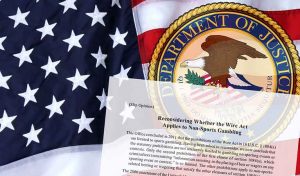The United States Department of Justice under the Trump Administration has been the center of attention for the past several months due to its new interpretation of the 1961 Wire Act. Previously, as per the 2011 reinterpretation of the law, its applicability was only limited to interstate sports betting. However, the new interpretation of the Wire Act seeks to apply to all forms of online gambling, a proposal that wreaked havoc on the gaming industries in a number of states including New Jersey, Nevada, New Hampshire, and Pennsylvania.
In fact, the New Hampshire Lottery Commission even went as far as filing a lawsuit against the Department of Justice’s new opinion – it was backed by other states as it pursued this and eventually emerged victorious when a federal court ruled that the Wire Act only applies to sports betting. Obviously, this was a big blow to the DOJ’s Office of Legal Counsel but there was a possibility that it was planning to appeal the decision, a decision that would require a significant amount of funding. Unfortunately, even that plan seems to be crumbling.
The US Congress has recently shifted some of its focus on the DOJ’s opinion on the Wire Act with the Rules Committee filing an amendment this week regarding the appropriations bill. This bill seeks to block the funding of any of the Department’s efforts with regards to the Wire Act.
“None of the funds made available by this Act may be used to enforce the Department of Justice Office of Legal Counsel memorandum entitled ‘Reconsidering Whether the Wire Act Applies to Non-Sports Gambling’ (issued on November 2, 2018).”
The new amendment is going to be voted on this week and from the looks of it, the Wire Act will not be affected in any way but the Department of Justice will no longer be able to enforce the new memorandum which is titled Reconsidering Whether the Wire Act Applies to Non-Sports Gambling.
Will It Work?
Well, the DOJ’s decision to reinterpret the Wire Act of 1961 has been a source of controversy since the very beginning. There have even been speculations that that casino mogul and online gambling opponent Sheldon Adelson may have had something to do with it. Furthermore, the DOJ has also been very reluctant to release any documents on the new opinion despite the Freedom of Information Acts that have been published.
With all that ambiguity and secrecy behind the opinion, there is even more suspicion and this certainly does not make the case for the opinion. As if that is not enough, the Rules Committee has an upper hand in this case simply because the Rules Committee also happens to be the body that is responsible for the salaries of the DOJ’s officials. As such, it seems that the only way forward is for the Department to retreat. But, will it?
-
Tags:







